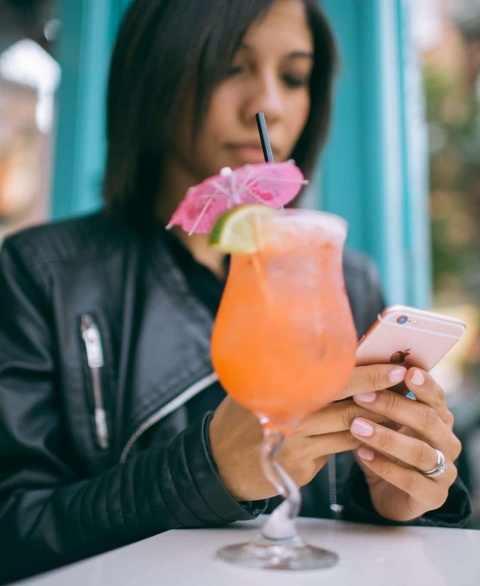News • High-proof posting
Social media usage linked to underage drinking
Social media often features celebrities drinking cocktails, boozy how-to posts, and party pictures. This is the environment American teens are immersed in every day, with 71 percent of teens using more than one social media site, spending an average of nine hours a day using media.
Despite the popularity of social media and alcohol-filled posts, little is known about the influence social media activity can have on teen and young adult and drinking behaviors. Penn Medicine researchers, led by Brenda Curtis, PhD, an assistant professor of Psychology in Psychiatry in the Perelman School of Medicine at the University of Pennsylvania, reviewed data on these topics and found a statistically significant relationship and moderate effect sizes between alcohol related social media engagement and both alcohol consumption and alcohol-related problems. The meta-analysis findings were published in Alcoholism: Clinical and Experimental Research.
Substance use, particularly alcohol, is frequently displayed on social media sites—this normalizes drinking for teens and young adults
Brenda Curtis
Curtis and colleagues identified 19 articles for the meta-analysis, representing data from more than 9,000 social media users across Facebook, Twitter, Instagram, and Snapchat. The analysis examined associations between young adults’ alcohol-related social-media activity—defined as posting, liking, commenting on, and viewing of alcohol-related content on social media—and their reported drinking behaviors and problems. The drinking measures evaluated included alcohol consumption and problems such as regret after drinking, blacking out, and sustaining injuries while drinking.
About 57 percent of young adults and 9.2 percent of adolescents consumed alcohol in the past month. Despite the pervasive use of social media and alcohol consumption by young adults, little is known about the potential influence engagement with social media can have on this group’s drinking patterns and risk of alcohol-related problems. “Substance use, particularly alcohol, is frequently displayed on social media sites—this normalizes drinking for teens and young adults,” Curtis said. “To date, reviews have considered drinking behavior in relation to risky behavior, such as binge drinking, or advertising content, rather than focusing on alcohol-related social media engagement. This meta-analysis allowed us to examine the relationship between alcohol-themed social media activity and alcohol consumption or alcohol-related problems in young adults.”

Through evaluating the selected data, Curtis and team uncovered a moderate strength of relationship across all 19 studies. The analysis showed a correlation between alcohol-related social media engagement and alcohol consumption. Additionally, the research showed a statistically significant relationship between social media engagement and alcohol-related problems. However, the direction of these associations remains unknown.
“Further research to necessary so we can better understand the cause and relationship between social media and alcohol consumption,” Curtis said. “This is especially important given that social-media sites can expose adolescents and young adults to alcohol content and marketing. This exposure may increase the likelihood of their drinking. Additional research can help determine the causal direction of these associations, which could provide opportunities for social-media-based interventions with young drinkers that incorporate machine learning, aimed at reducing alcohol consumption and alcohol-related issues.”
Source: Perelman School of Medicine at the University of Pennsylvania
23.05.2018







